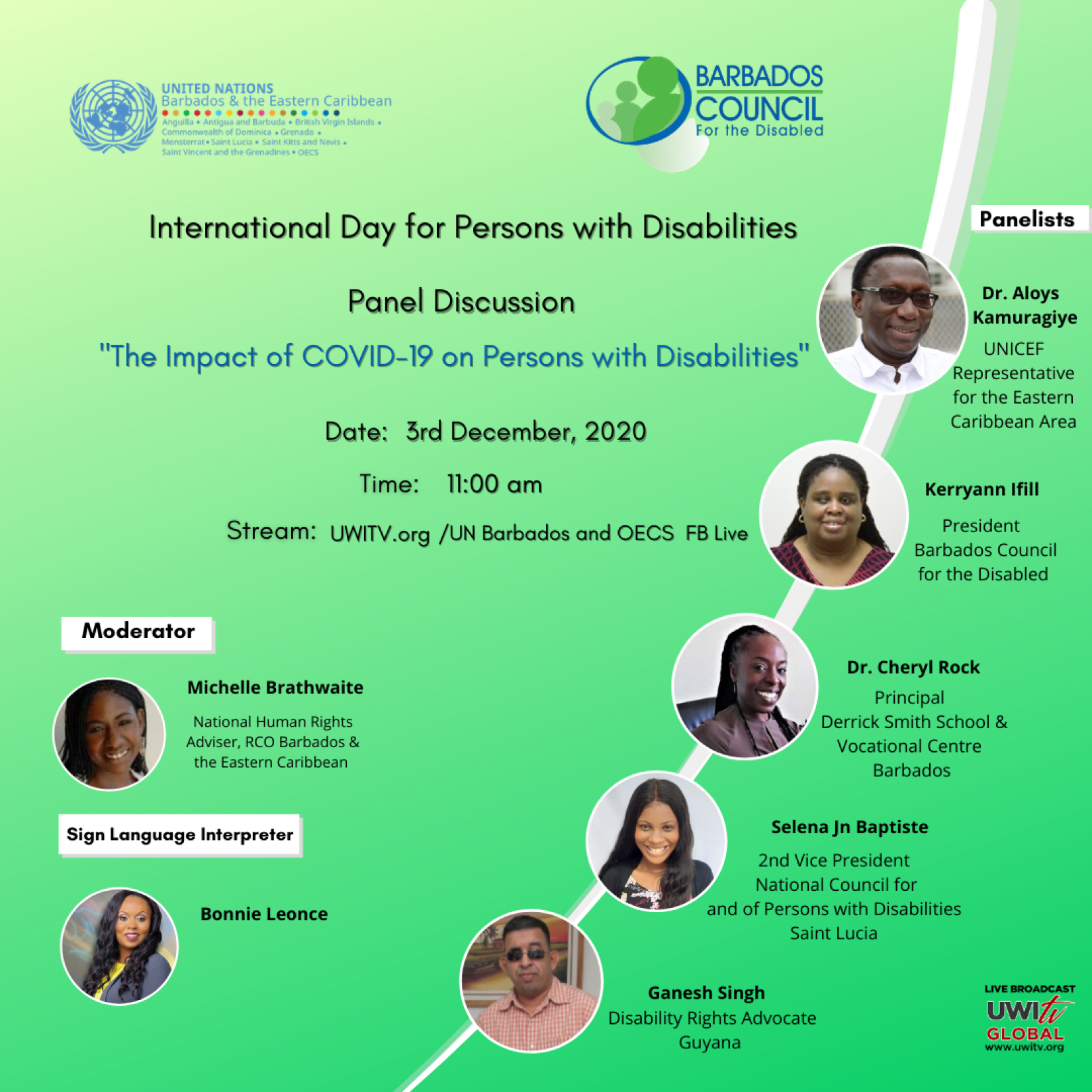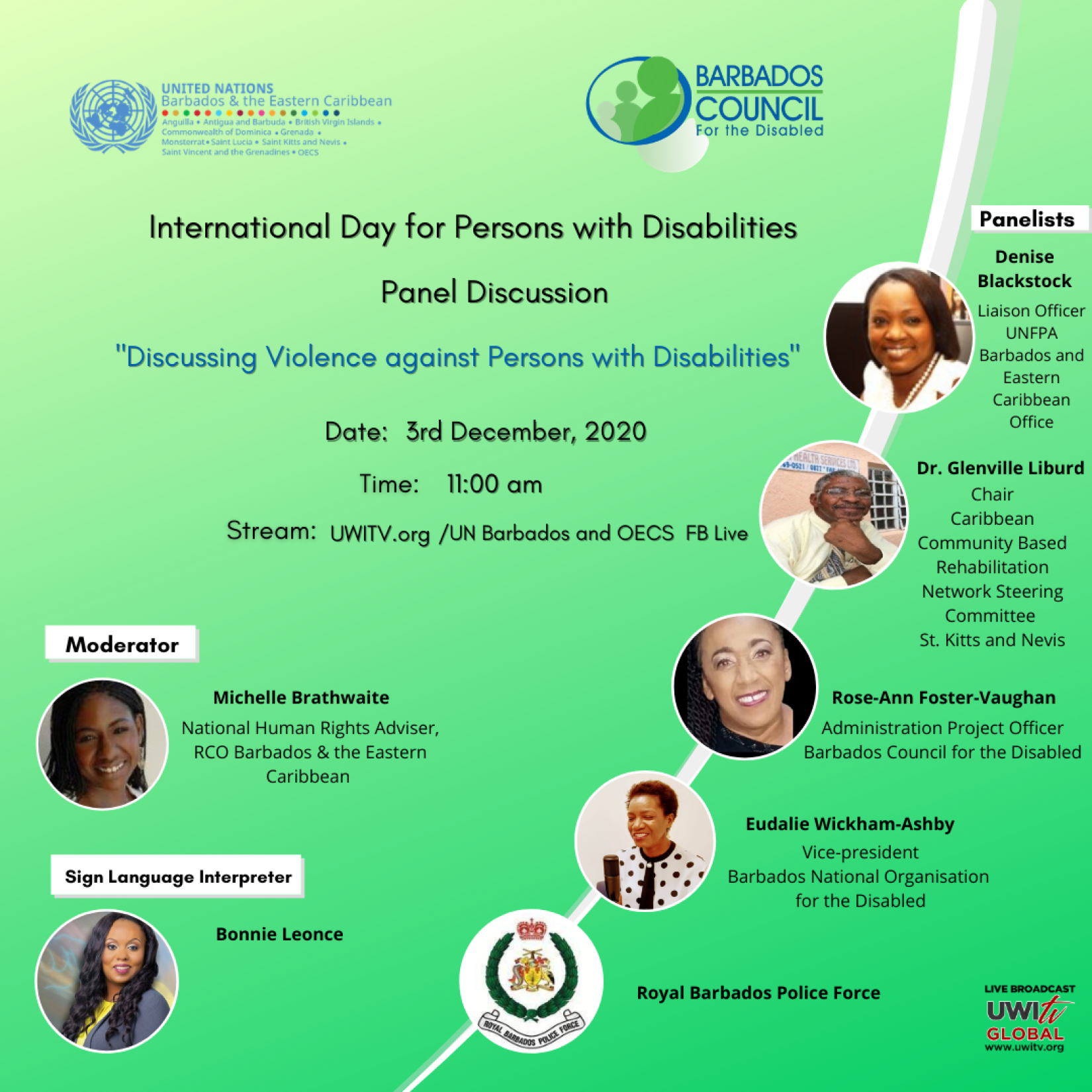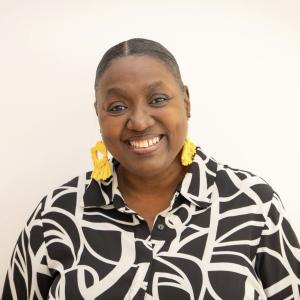Regional Dialogue held to celebrate International Day for Persons with Disabilities.
03 December 2020
- United Nations Barbados and the Eastern Caribbean has reiterated its commitment to ensuring a more inclusive, sustainable and peaceful world for all, particularly persons living with disabilities.
On December 3, which is globally observed as International Day for Persons with Disabilities, the UN Sub-regional Team for Barbados and Eastern Caribbean partnered with the Barbados Council for the Disabled to host two virtual dialogues which reaffirmed the importance of disability inclusion. The global theme for IDPWD was: ‘Building Back Better: toward a disability-inclusive, accessible and sustainable post COVID-19 World’.
The dialogues kicked off with video messages from the UN Secretary-General, António Guterres, and UN Resident Coordinator, Didier Treucq.
The Secretary-General expressed that “Disability inclusion is a fundamental human right.” and when we fight to secure those rights, we move our world closer to upholding the values and principles of the United Nations Charter.
UN Resident Coordinator, Didier Trebucq reaffirmed the UN’s commitment to work with the community of persons with disabilities so "that the needs and rights of the community are met in their daily lives and also during emergencies".
Following these messages were remarks from Barbados Ambassador to CARICOM, David Commissong, President of Disabled People's International North America & The Caribbean Inc, Merphilus James, and Antigua and Barbuda’s Ambassador to the Permanent Mission of Antigua and Barbuda to the United Nations, His Excellency Walton A Webson.

The Impact of COVID-19 on Persons with Disabilities
Discussions on the Impact of COVID-19 on Persons with Disabilities, during the first dialogue, revealed that they had been severely impacted by the COVID-19 pandemic, with access to communication and education being the biggest obstacles. We heard that the global requirements to wear masks have cut off one form of communication for persons with hearing disabilities, who also lip-read, and that the need to adapt to remote learning has excluded girls and boys with disabilities.
UNICEF Representative for the Eastern Caribbean Area, Aloys Kamurigye noted that without access to assistive devices to allow participation in distance learning, children with disabilities would be excluded from communication.
According to the UNICEF Representative, a global social economic survey regarding the impact of COVID-19 on children with disabilities conducted by UNICEF, revealed that 155 countries reported an increase in exclusion from education due to remote distance learning. Only 60 countries reported that governments provided instructions and devices accessible to children with disabilities.
Though remote learning has its setbacks, it was noted that it also provided new opportunities for some persons with disabilities.
President of Barbados Council for the Disabled, Kerryann Ifill explained that moving to a remote school environment meant that “children who couldn’t participate because of their incontinence, now have an opportunity to do so.”
In referencing the “new normal”, Principal of the Derrick Smith School and Vocational Centre in Barbados , Dr. Cheryl Rock underscored that we must adapt to these times by placing children with disabilities into projects, allowing them to work on real life issues that impact them. She maintained that 2020 has taught us that you can leave school one day and not return for the next six months. “So, adjusting students to the new normal is the responsibility of all of us,” she maintained.

Discussing Violence against Persons with Disabilities
With regard to the second dialogue, Violence Against Persons with Disabilities, it was highlighted that both children and adults with disabilities are at much higher risk of violence than their non-disabled peers.
Speaking from her years of experience in conducting school visits, Administration Project Officer for Barbados Council for the Disabled, Rose-Ann Foster-Vaughn underscored that children with disabilities are not always aware that they are being violated. She made an appeal for linkages to be created with organisations like Family Planning and to educate these agencies on how to deal with persons with disabilities.
Vice President of Barbados National Organization for the Disabled, Eudalie Wickham- Ashby, offered several tips and practices to help individuals with disabilities to protect themselves. One included developing a danger signal with a close neighbor. Inspector Stephen Griffith of the Royal Barbados Police Force encourages persons to report all matters regarding violence against persons with disabilities so that these serious infringements can be mitigated. He maintained that police have a job to do and they need to be informed.
However, there is a need for more relevant data on persons with disabilities. UNFPA Liaison Officer for Barbados and the Eastern Caribbean, Denise Blackstock highlighted the need for actual numbers, the types of disabilities and the ways in which persons with disabilities are impacted by violence so that more targeted policies and programmes can be implemented.
If you missed the dialogue, you can watch it again here: https://fb.watch/2rdLVgI3Oa/

Carol A. Gaskin
In her capacity, she leads communication and advocacy efforts for the UN Resident Coordinator's Office, overseeing operations in 10 Eastern Caribbean countries. Additionally, she chairs the UN Communications Group, fostering collaboration among communicators from 18 agencies.
Carol's expertise lies in developing communication strategies aligned with the Sustainable Development Goals and the 2030 Agenda. She excels in storytelling, utilizing various channels to amplify the UN's message effectively.
Her achievements include coordinating impactful events such as the "UN in the City" SDG exhibition and spearheading initiatives like the introduction of the Caribbean's first SDG-branded electric bus. Notably, Carol has received recognition for her outstanding work, including the Best Annual Results Report for Latin America and the Caribbean in 2023.
Her work extends to humanitarian efforts, notably providing coverage during natural disasters like the La Soufriere eruption.
With a proven track record of success and dedication to advancing global priorities, Carol A. Gaskin is a respected figure in the field of international development and strategic communication.

